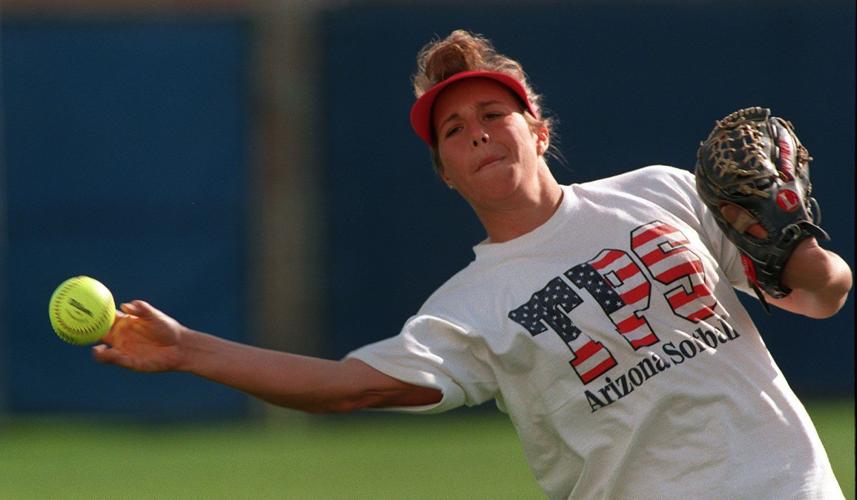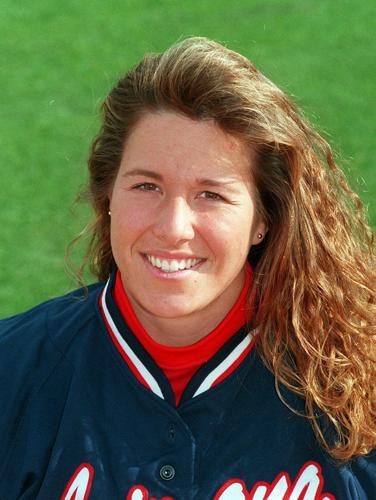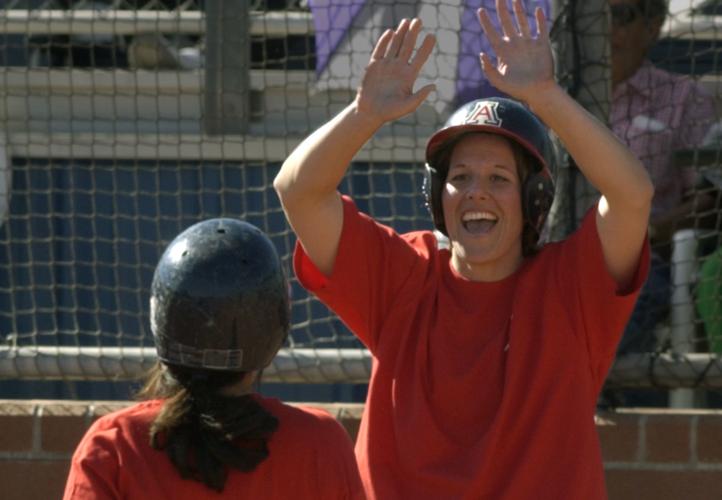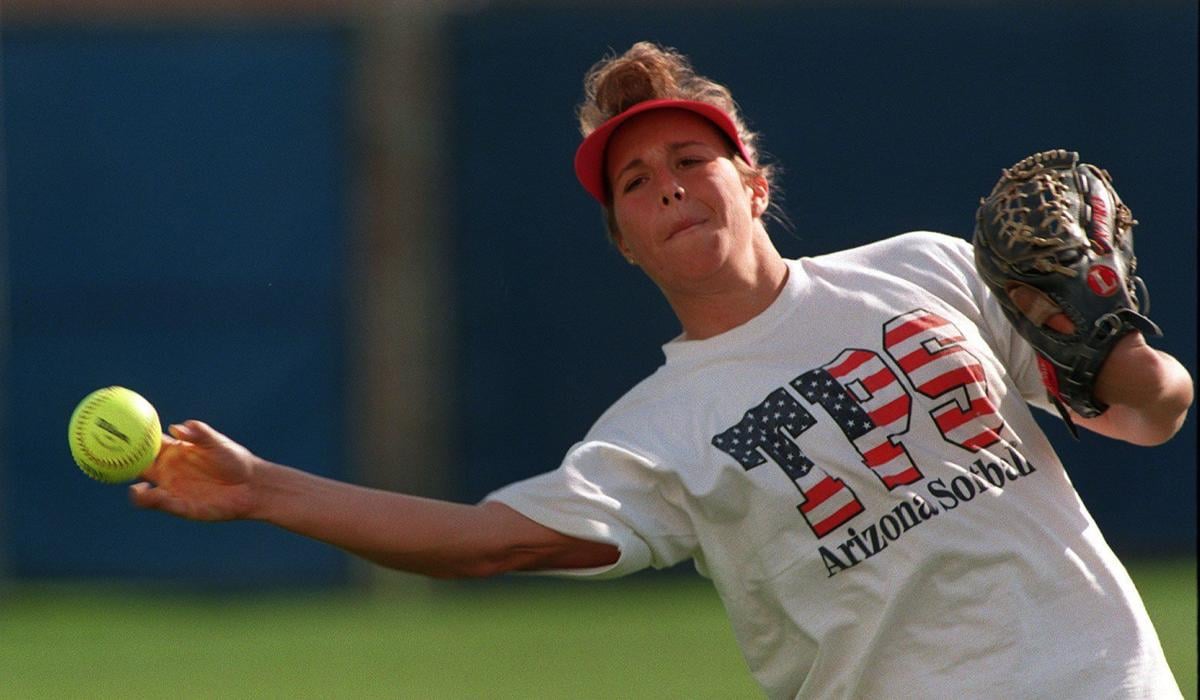Jenny Dalton-Hill has witnessed softball from every vantage point — on the field, in the dugout, and in the TV booth.
And now she has added another angle — in the stands watching her daughter, Brookelyn, play first base and outfield for Paul Laurence Dunbar High School in Lexington, Kentucky.
For most people, watching your child play a sport is easy.
But it’s not so easy for someone who played softball at an elite level — winning three NCAA national championships at Arizona — or who coached this same Bulldogs team in Lexington.
Dalton-Hill stopped coaching in Brookelyn’s junior year. She wanted her daughter to experience playing for someone other than her mom.
“It’s difficult to do it from the other side,” said Dalton-Hill. “Being a parent you have no control. As a player you may or may not play well, but you have a glove or bat on your hand. As a parent, it’s just telling them to play as hard as they can and letting them know you are there if they need you.
“My heart beats between the white lines. But she needed to be herself on the field and I needed to learn my role as a parent. When you sit outside the field you clap and be quiet. You are not the coach, even though you know one word could help.”
Brookelyn, who has been playing since she was 5 years old, found her hitting stroke with 10 home runs — a Bulldogs season record — in her junior year. She will play for BYU this season.
“It’s neat we can share something that means so much to me,” said Dalton-Hill, who played at UA from 1993-96. “It was hard for her to follow in my footsteps — a Mom who had so much success in the sport.”
And what an Arizona career she had.

Jenny Dalton-Hill
Dalton-Hill still holds the NCAA career RBI mark with 328. She was the first and now one of only nine players to hit .400 with 200 RBIs and 50 home runs along with an .800 slugging percentage. And her name is all over the UA record book.
She is the Wildcats’ leader in RBIs, walks, runs and slugging percentage and is in the top 10 for a handful of others.
She was Pac-10 Player of the Year, National Player of the Year, and College World Series MVP as a senior.
But Dalton-Hill would be the first to tell you that it was all about those championships. Not many can claim to have played in four consecutive national titles, let alone win three.
“Now I look back and am amazed at what we were able to do,” said Dalton-Hill. “We were always pushing to get better and I think that is what gave us the opportunity to be in the national championship every year.
“It was my reality and I didn’t know any different. Now, it’s hard to analyze games for ESPN. We were there every year. Playing at Arizona set a high bar and I expect the elite to be there every year. That’s not how it is. We were the exception to the rule.”
Today she takes the experience and knowledge of what it takes to play for a title every year — in the game that makes her heart beat — and shares it with a national audience. Dalton-Hill works SEC games and on games leading up to the World Series.
“On ESPN, a lot of what I see is the mindset of the game we all learned from coach (Mike) Candrea,” said former UA teammate Krista Gomez-Humphreys. “She gives insights into softball, family, and life. It all comes out.”
Each of Dalton-Hill’s rings has a special meaning to her. It was the first one that was unbelievable. It showed how UA coach Candrea trusts his instincts and how Dalton-Hill would doing anything to help her team win — even playing with an injured ankle.
“In 1993, my freshman year, I split time playing second base with Krista all year,” said Dalton-Hill. “I came into Arizona as a shortstop. I never felt comfortable at second base until coach told me I was playing second in the World Series. I finally felt like I had arrived; like I could let my hair down. We went to practice Wednesday and I blew out my ankle on the last sprint of the last practice. I couldn’t walk and I sat in the training room the entire time.
“For the semis I asked the trainer if I could sit in the dugout. I was taped up; it was like a cast and they let me sit in the dugout. Coach asked me if I could hit and I said yes and ran out. I was so excited — I walked. We won the game.
“So, for the finals, I was in the training room and asked again if they’d let me sit up there. And I asked if I could play catch before the game with my partner, Leah O’Brien. Coach comes out of the dugout and it doesn’t look like he is walking toward me, but he gets 20 yards away and asks, ‘Dalton, can you play at short?’ I hadn’t been on the field in a week. This spoke volumes of being a winning coach and trusting your gut. Sometimes you go with what you think to be true and right.”

Jenny Dalton-Hill celebrates at home after having a good day at the plate with a couple of hits and a home run in the UA alumni game in 2006.
The next title was different. While Dalton-Hill says that so many things have to go your way to win it all — the right draw, the right umps, and the right players — title No. 2 came easy.
“I would put that team against any national championship team from any era,” said Dalton-Hill. “It was a walk in the park. We did play great teams but our team had it figured out. We had no doubts. We knew that if I didn’t do it, the next player up would.”
Even though they shared playing time at the same position during Dalton-Hill’s freshman year, her and Gomez-Humphreys were close. They would go on to avenge their only non-title year by leading the Wildcats to another ring in 1996.
This championship run, however, was more difficult.
The Wildcats had lost four top players to graduation, a medical redshirt, and the Olympics, and started losing ... a lot.
“Us knowing we had each other’s back was the difference,” said Gomez-Humphreys, softball coach at Corona Centennial. “It was fun to go out every day and play with her. We knew how to get there (World Series) and knew how to win. When no one knew at the time where we’d end up, we believed. And when Jenny believes, there is no stopping her. Jenny was dedicated to her teammates on and off the field. She would do whatever it would take for us to win.”
And to think Dalton-Hill wasn’t supposed to be a Wildcat. The plan was to go to UCLA; it was practically in her backyard. But it all came down to that gut feeling.
“I felt at home in coach’s presence,” Dalton-Hill said. “It was who he was and how he coached. For me, he’s that guy I’d stand in front of a moving train for. He was the first to teach me how to play. Before they rolled out the ball and I played. He took time to invest in me as a person. He taught me to understand … to feel with my body what I was supposed to do. So I understood my own swing. Coach helped me feel what I needed to do.
“He told me freshman year that I needed to be a leader. It was a tough year as I was learning a new position and I felt I was doing everything wrong. By the time I was a senior it was all in my back pocket, so I could pull that out, be a leader and win a national championship for him.
“He gives so much, there is nothing you could buy or give him — he has gold medals. One thing he can’t get on his own is a national championship. So when you win it, you are so grateful you could find a way to pay him back just a little bit.”







